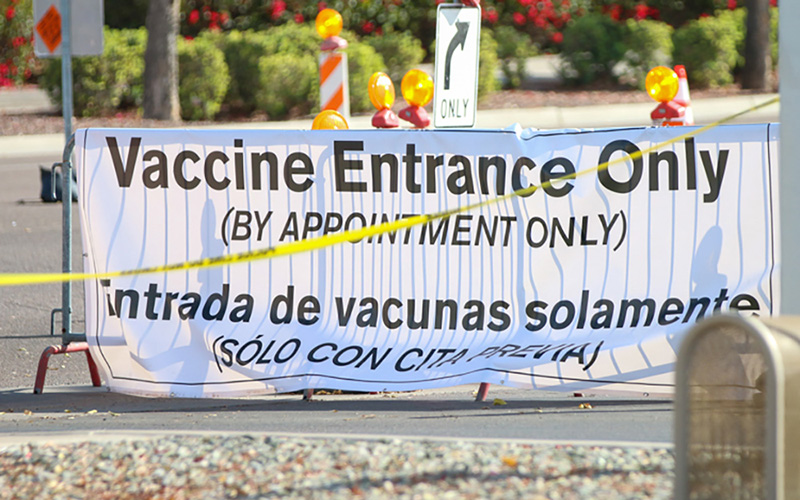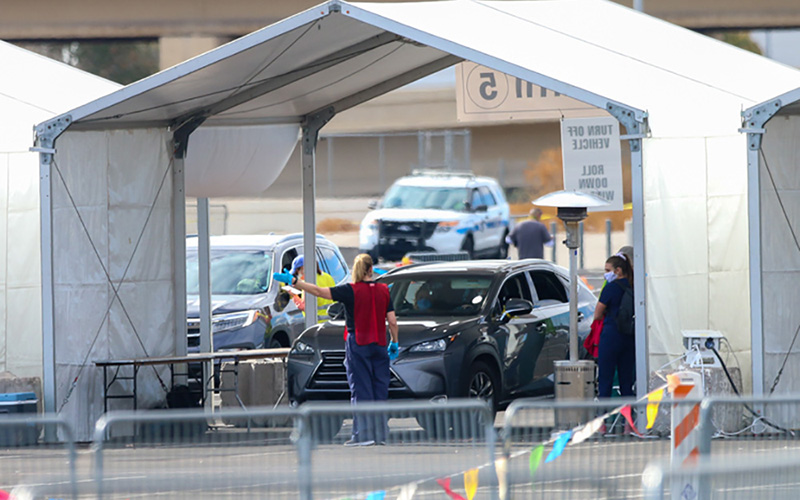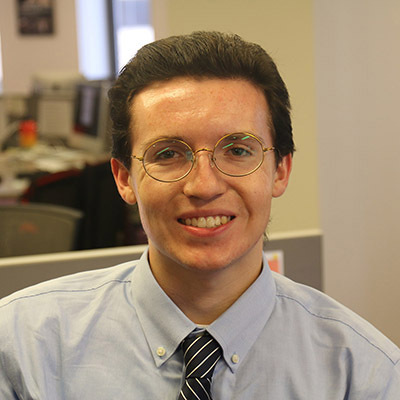
Arizona officials had administered close to 460,000 doses of coronavirus vaccine as of Monday, but the COVID-19 threat is far from over. More than 12,000 deaths in the state have been linked to the disease, making it one of the leading causes of death in Arizona over the past year. (Photo by Marlee Smith/Cronkite News)

Cars line up for COVID-19 vaccinations while in their care on Thursday at State Farm Stadium, a 24/7 vaccination distribution site in Glendale. The state has administered tens of thousands of doses at the site to people in the priority groups for the vaccine. (Photo by Marlee Smith/Cronkite News)
WASHINGTON – COVID-19 may now be the leading cause of death in Arizona, apparently surpassing both cancer and heart disease for the number of fatalities in a year, according to the latest data from the Arizona Department of Health Services.
The COVID-19 death toll through Monday was 12,448, according to numbers reported by the state Tuesday, a year after the first case in Arizona was confirmed on Jan. 26, 2020.
That was more than the 12,097 Arizonans killed by cancer in 2018, the most recent year for which mortality statistics are available from the department, and more than the 12,410 killed by heart disease that year.
Arizona is not the only state that has seen COVID-19 surge to become the leading cause of death, said Amesh Adalja, an infectious disease physician at Johns Hopkins University. And it “shouldn’t be a surprise,” he said, given the severity of the pandemic.
“There have been weeks where COVID-19 has been the leading cause of death in the country,” Adalja said. “It underscores that this isn’t something normal, it’s not just another respiratory disease.”
The death toll is just another in the list of shocking numbers generated by the pandemic: In Arizona alone, there have been 727,895 confirmed cases, more than 90% of beds in intensive care units are currently occupied and the state had administered 458,461 doses of vaccine by Monday, less than a month after distribution started.
More than 24.8 million cases have been confirmed in the U.S. as of Sunday, according to the Centers for Disease Control and Prevention, which said 416,010 Americans had died from the disease.
And state and federal officials say things will get worse before they get better.
As he signed a series of executive orders Thursday dealing with the U.S. response to the pandemic, President Joe Biden warned that the death toll could top half a million within the next month.
AZDHS Director Dr. Cara Christ on Friday touted the state’s efforts to administer vaccinations to hundreds of thousands of Arizonans. She said “the vaccine’s really what’s going to bring us back, not immediately but several months down the line to some sort of normality.”
“It might not be back to what we were used to prior to the pandemic, and I think that’s a hard thing to think about,” she said.
While the percentage of intensive care beds in the state occupied by COVID-19 patients has fallen from 66% on Jan. 11 to 57% by Sunday, that is more likely “the very beginnings of a plateau” rather than a sign that the disease has peaked, said Dr. Joshua LaBaer. He predicted on Wednesday that COVID-19 could topple cancer and heart disease as the state’s leading killer.
“COVID-19 is angling up for being the leading cause of death in a 12-month window … probably in the next week or so,” LaBaer, the executive director of Arizona State University’s Biodesign Institute, said in a news conference Wednesday.
Adalja said the only comparable time in recent history was the 1918 flu pandemic, when 675,000 people died in the U.S. alone. Other deadly infectious diseases, such as HIV/AIDS, topped the death count of particular populations, he said, but did not affect all groups as the 1918 pandemic and COVID-19 have.
Arizona has been a hotspot for the disease almost since it was first discovered. Its number of cases per capita has routinely topped the U.S. rate and twice – through June and July, and again earlier this month – posted the highest infection rates in the world, according to 91-divoc.com, a site that uses Hopkins data.
David Kolovson, a spokesperson for the American Cancer Society, said that in its 108-year history, the organization had never “faced a health care crisis as daunting as COVID-19.” He said that not only are cancer patients especially vulnerable to COVID-19, they are hit by it in other ways, too.
“80% of cancer patients reported some sort of delay of care thanks to COVID-19 … people can’t get to cancer screenings,” Kolovson said.
Like cancer and heart disease, Kolovson said, COVID-19 is particularly dangerous for older people. Of the more than 12,000 people in Arizona killed by COVID-19, state data show that 9,130 of them were 65 years or older, accounting for three in every four deaths.
Christ said the fact that COVID-19 deaths are surging past cancer and heart disease deaths was “part of the decision making for adding those that are 65 and older are prioritized phase 1-B,” which had previously had an age cutoff of 75.
Under the state’s current vaccination plan, the first doses went to health care and emergency workers in phase 1, followed by priority phase 1-B that includes teachers, “protective services workers” and – as of 10 days ago – people 65 and older.
While health officials are urging people to remain vigilant, despite the availability of a vaccine, they are also encouraging people not to get discouraged. Biden insisted Friday that “we will get through this. We will defeat this pandemic.”


